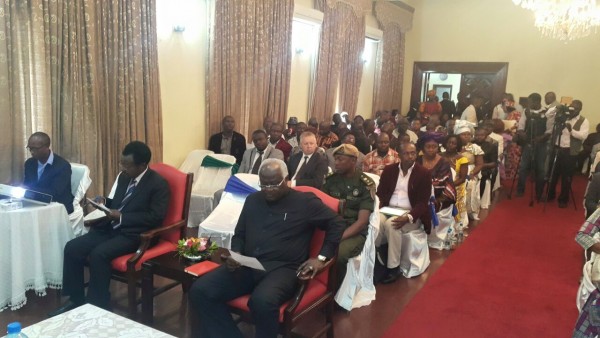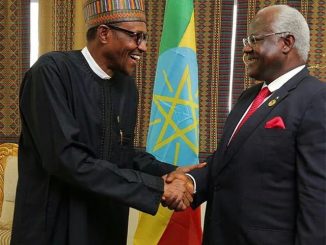
By State House Communications Unit

There have been sustained efforts by the presidency of Sierra Leone to enhance effective service delivery.
Over the past several years, the Office of the President, through its Directorate for Performance Management and Service Delivery (PMSD), has introduced and championed the ‘Performance Contracting System’ which sets out annual objectives and activities for Ministries, Departments and Agencies (MDAs) and the nineteen local councils.
The performance contract system requires those various public institutions to sign an agreement with the Office of the President against agreed objectives and activities. At the end of the year, these government institutions are evaluated on the basis of their contracts and a scorecard for each of them is presented to President Koroma.
On Thursday June 4, 2015, at State House Credentials Hall, the assessment of the 24 ministries and 19 local councils was presented (in clusters) to the President. The report shows that several MDAs were rated as VERY GOOD performers including; the Ministries of Social Welfare, Gender and Children’s Affairs, Defence and Works, Housing and Infrastructure. Others such as Fisheries and Marine Resources, Energy, Attorney General and Justice, Trade and Industry, Sports, Tourism and Cultural Affairs and Water Resources were captured under the GOOD category.
 Commenting on the outcome of this year’s performance contract reviews, and in an apparent reference to the Ebola outbreak, President Koroma said firmly that “those who performed badly have no reason for doing so because others have performed well under the same circumstances”.
Commenting on the outcome of this year’s performance contract reviews, and in an apparent reference to the Ebola outbreak, President Koroma said firmly that “those who performed badly have no reason for doing so because others have performed well under the same circumstances”.
For those who performed below per, the President had this strong message – “If opportunities given to perform are not properly utilized then the next performance management contracting results will be announced differently”. What the president meant by that statement might not be too obvious to others but ‘he who feels it, knows it’.
President Koroma went on to commend those MDAs that made the marks irrespective of the difficult challenges imposed by the Ebola epidemic. At the same time, he urged Bonthe and Koidu New Sembehun cities as well as other districts and councils to work hard.
When the Ebola epidemic struck Sierra Leone, it practically shut down the country and claimed the lives of many Sierra Leoneans including doctors and nurses. It struck fear among the local population and around the world. The government had to close schools down, farmers ran away from the fields, the public became fearful of health facilities thereby hampering access and coverage, especially of children under fives, pregnant women and lactating mothers; and while flights avoided the country, international busineses folded up as local ones crumbled. One year on, the virus has been contained and being eliminated. Many flights have resumed, investors are returning, local businesses are picking up, schools have reopened and the Government is restoring hope and livelihoods with seeds supplies to farmers, learning materials and subsidies to schools and cash transfers to vulnerable groups.
In spite of these gains, there is still some resistance in maintaining zero especially when “people in leadership are violating the laws”. President Koroma is visibly concerned over this sad development and the fact that Sierra Leone is still recording new cases albeit very few.
“If we don’t get out of Ebola as a nation it will be difficult for us”, he said adding that “everyone should comply with the regulations being provided by the Ministry of Health and the National Ebola Response Center”.
On the performance contracts reviews, President Koroma reiterated that the outbreak should provide no excuse for anyone not to deliver on their agreed objectives. He informed that even with the outbreak, he is preparing to get himself reviewed and assessed by his colleagues under the aegis of the African Peer Review Mechanism which will take place in Johannesburg, South Africa.
Performance management contracting promotes accountability and transparency, efficiency and keep staff and the public abreast with happenings in the various institutions, said Mr. Saidu Conton Sesay, Chief of Staff in the Office of the President.
Senior Director Strategy and Policy Unit, (SPU) Prof. Victor Strasser-King explained that performance management looks at project tracker, managerial indicators among others and that MDAs are assessed periodically throughout the year to ensure that they follow the trackers and the activities as they are measurable and time bound.
Prof. Strasser-King said the process is normally followed by a peer review. He reported that among the challenges identied by SPU across MDAs were inadequate capacity of staff, weak resource mobilization, lack of collaboration between MDAs. He said these are exacerbated by the inability of the leaderships of institutions to expose poor performances.
Performance management contracts have been part of President Koroma’s good governance initiatives and has had a positive impact on the government’s good governance ratings and service delivery performance. The latest MO Ibrahim Good Governance Index rates Sierra Leone ahead of Egypt, Nigeria, Kenya and Liberia. It states that the country has made significant progress on Safety and Rule of Law, Participation and Human Rights, Sustainable Economic Opportunity and Human Development. On accountability, the report shows remarkable improvement with a high grade point of 9.4.



